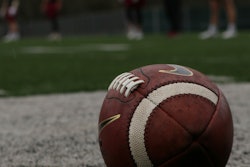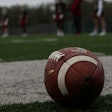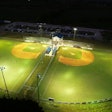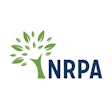Copyright 2017 News & Record (Greensboro, North Carolina)
All Rights Reserved
News & Record (Greensboro, North Carolina)
GREENSBORO - Greensboro is playing catch-up with other North Carolina communities by only recently opening its first public parks for skateboarders and aficionados of similar "extreme sports."
New skate structures at Latham Park and Glenwood Recreation Center cater to a popular sports subculture that cities from Asheboro to Mount Airy, Raleigh to Charlotte have long served with specialty parks.
Skateboarders say they love the sport because of the dexterity and physical conditioning, the individuality and the tenacity that are required.
But they also are attracted by the element of risk that many defy by shunning the protective gear that the law requires at public parks, especially helmets, as they hurtle into a "vert" or pull off some other hair-raising stunt.
Many teens and young adults using the city's new skate parks simply disregard requirements that they don helmets and pads, partly in response to peer pressure.
"It's kind of seen as an un-cool thing to do," Greensboro skateboarder Nate Church said recently after skating helmetless at Latham Skate Park, which opened on Hill Street about three months ago. "To wear a helmet would be the proper thing to do, so it's not counterculture."
Tragedy ahead?
Church hastened to add that he and others take care to avoid injuries by not attempting challenging maneuvers that are beyond their level of skill.
"I never think about having a helmet on, it's so foreign to skateboarding," said Church, 24, who began skating in his teens at a privately owned and now-defunct indoor park in southwest Greensboro. "When you land, it just feels good."
But the potential for injury is real. Risks range from mid-air falls to collisions with other park users and being hit by someone else's errant, airborne board.
Helmets in particular are essential to minimizing the carnage that can occur in a recreational activity that combines steep obstacles with bodies speeding over hard and unforgiving surfaces, said Dr. James Wyatt, director of Cone Health's trauma services department.
"Have we seen a surge in injuries (since the parks opened)? No, we haven't," Wyatt said. "But over time, will we get some additional injuries, some tragic ones? I bet we will."
"Unless there is some enforcement of it," Wyatt said, referring to helmet use, "it's unfortunate that we just have to see these things happen."
Wyatt said that in years past he has seen skateboarders in the Greensboro area who suffered injuries that left them "hospitalized for up to three months."
"We've also seen people who became brain dead from it, skateboarding without a helmet and suffering injuries that have left them brain dead," he said. "I feel very passionate about this."
'You're going to die'
Not all skateboarders go without protective gear at the new parks. They just find themselves in the minority at times, as did helmet-clad Elliott Rodgers of Chapel Hill one recent afternoon at Latham.
"Really, people think it's lame to wear a helmet. And in some areas, it is lame," said Rodgers, 24. "But I'd rather not get a concussion."
To emphasize the helmet's value, he nodded toward the "bowl," the sloped, swimming pool-sized depression with an 8-foot drop to a concrete bottom that is one of Latham Skate Park's more distinctive features.
"If you fall off there and hit your head on the bottom, you're going to die," Rodgers said.
Local skateboarders waited a decade for the public skate parks after Greensboro voters approved a 2006 bond referendum that included money for such facilities.
The two sites, smaller Glenwood Skate Spot and the more elaborate Latham, were designed and built by top-notch skateboard contractors after a cooperative planning effort that included an advisory panel made up of skateboard and other extreme-sport enthusiasts.
But it remains an open question whether Greensboro and other cities have developed a workable strategy to adequately protect skateboarders from injury while at the same time assuring heavy usage of these facilities that are not inexpensive to build.
Greensboro spent about $575,000 on its two new facilities that are largely unsupervised, meaning that no city Parks and Recreation Department staff is continuously on hand during hours of operation to make sure that skateboarders, freestyle bikers and inline skaters are wearing helmets and other protective gear mandated by city ordinance.
No enforcement power
In addition to helmets, the ordinance requires users to wear elbow and knee pads. But with nobody to enforce those rules, many ignore them, and the Latham Skate Park in particular attracts a steady stream of visitors with its laissez-faire environment.
City park officials check periodically on the two skate parks, although they lack authority to enforce the ordinance requiring protective gear that carries a $25 fine per violation, said Madeleine Carey, a Parks and Recreation Department planner.
City police have that power, she said.
But Greensboro officers have more pressing duties, said Greensboro police spokeswoman Susan Danielsen.
"We include these areas in our routine patrol, but do not actively enforce the ordinance," Danielsen said of the two skate parks. "Much like the noise ordinance, if there is no complainant, there is little benefit to citing someone for violating the provisions of the order."
Danielsen said police leaders believe that "our enforcement efforts can have a much bigger impact by addressing violent and property crimes."
On the other hand, running skate parks under close supervision also can have negative consequences, such as the declining usage that has occurred at the Asheboro Skate Park.
Nice park, no skaters
The park on South Church Street sat bereft of skateboarders recently on a gorgeous, Friday afternoon in mid-August. But someone was on hand to charge a $2 entry fee, make certain all skaters wear helmets and pads, and rent protective gear to those who didn't have it.
Was the empty skating surface an aberration at the well-equipped facility that opened in November 2006 at a cost of about $200,000? Isn't the park still popular?
"Honestly, not much anymore," said Matthew Dalton, program coordinator for Asheboro's department of cultural and recreational services. "We started charging (entry fees). And they have to wear pads and helmets, and the kids just don't like that."
A big fight?
Another open question is the extent to which Greensboro and other cities hosting skate parks could be hit with big damage awards for injuries suffered because of a local government's alleged negligence or its failure to properly warn users of potential dangers.
The state law passed in 2003 to protect county and city governments from such lawsuits is ambiguous and contains loopholes that might allow an injured skateboarder to prevail in court, said private attorney Seth Cohen of Greensboro.
Such a case would be difficult for an injured skateboarder to win, but there is sufficient lack of clarity in North Carolina's skate park law that a successful lawsuit remains within the realm of possibility, Cohen said.
"The bottom line is that if and when there is a serious injury somewhere, there is going to be a big fight," he said of the court battle likely to ensue.
Interim Parks and Recreation director Phil Fleischmann said he did not know whether Greensboro carries any insurance that would cover it against skate-park damages under such circumstances.
He referred a reporter to City Attorney Tom Carruthers for the answer.
Carruthers did not respond to an Aug. 8 email from the News & Record asking about the city's potential legal liability stemming from serious injury suffered at its skate parks. He also did not respond to phone calls Thursday and Friday seeking comment.
Hazardous recreation
North Carolina legislators passed the 2003 Hazardous Recreation Parks law with the aim of spurring city or county officials across the state "to make land available ... for skateboarding, inline skating or freestyle bicycling."
"It is recognized that governmental owners or lessees of property have failed to make property available for such activities" because of potential lawsuits and the high cost of liability insurance, legislators said in the law's preamble.
So the statute shields local governments from lawsuits if they do two things:
Adopt "an ordinance requiring any person riding a skateboard at the facility to wear a helmet, elbow pads and kneepads."Post signs at the skate park "affording reasonable notice that any person riding a skateboard at the facility must wear a helmet, elbow pads and kneepads, and that any person failing to do so will be subject to a citation under the ordinance."
Greensboro adopted the required ordinance and posted the signs before either skate park opened. So the City Council did take some action to insulate taxpayers from damages.
But unlike some North Carolina communities, Greensboro does not require all skate park users to sign a waiver and a formal promise not to sue if they are injured there.
Raleigh, Mecklenburg County and Asheboro are among those that do.
"Individuals using this skate park are hereby expressly warned that use of this facility may result in death, paralysis, brain damage, concussion, broken bones or other serious injury," reads the Asheboro Skate Park Liability Waiver that must be signed by a parent or legal guardian for those under 18.
Failure to warn
But the state law enacted 14 years ago still leaves an opening for injured skateboarders to press their case, if their wounds stem from "gross negligence" by the government or from "failure of the governmental entity or public employee to guard against or warn of a dangerous condition."
That suggests the path to a lawsuit could be so simple as a paver that has settled into the ground at the bottom of one of Latham Skate Park's ramps, creating a gap that might cause someone to fall.
Several skateboarders mentioned the problem to a reporter in recent interviews.
"It's right where the landing is on the down ramp," Winston-Salem skateboarder Justin Harris, 20, said of the flaw at the Latham facility in a recent interview. "Other than that, I really liked it."
In another type of miscue, park officials earlier this month were not monitoring Latham Skate Park closely enough to notice that both warning signs required by state law had been stolen.
The signs alerted skateboarders to the likelihood that they would fall at some point during their visit and to the ordinance requiring helmets and pads.
City officials knew that one of the signs had been pilfered, but were not aware the second also was gone until a reporter asked about it, Carey said.
"We have some older signs that we are installing until we can get new ones made and installed with more vandal-proof hardware," Carey said.
Safer than the streets
Meanwhile, statistics suggest that skateboarding results in no more injuries than other sports that carry some risk of contact or collision; studies by the Consumer Products Safety Council place it well behind football, basketball and baseball in terms of injuries suffered by participants.
Another group, the National Safety Council, found that in 2015, more than 125,000 people were treated in hospital emergency rooms after being injured skateboarding. More than half of them were ages 14 to 24, and about one-third were between the ages of 5 and 14, the group's research showed.
The group noted that the number of injuries caused by skateboarding is "somewhat high." Basketball, bicycling and football rank in the top three, while skateboarding comes in eighth.
Interim Greensboro parks director Fleischmann said last week that he was not aware of anybody who suffered a significant injury at either of the city's skate parks. Glenwood Skate Spot opened in January, Latham in May.
Greensboro built its skate parks to make sure that skateboarders had a place to ply their skills other than the streets, where severe injuries are more likely to occur, said Carey of the city Parks and Recreation Department.
"Skate parks are much safer than having skate boarders skate out in public," she said.
In fact, there were two skateboarding deaths in North Carolina during 2015 - the latest year for which state-by-state data is available. Both fatalities happened on public streets:
A 15-year-old resident of Mount Airy lost control that spring and went skateboarding through a stop light into an intersection, where he was hit by a pickup.A 23-year-old man died several months later in Durham after he similarly rode into the path of a pickup at a downtown intersection.
Carey pointed out that Greensboro's hands-off approach to daily skate park operation is hardly unique. Communities from Winston-Salem and Kernersville to Raleigh and Mount Airy follow similar patterns, she noted.
Winston-Salem opened its unsupervised skate park near that community's fairgrounds three years ago, with more than 15,000 square feet of ramps, quarter pipes, grinding rails and an elongated "pump track" that helps users learn how to maintain balance. That's about a third larger than Latham and three times Glenwood's size.
Old Man Jam
One recent weekday afternoon, Forsyth Tech student Harris and six other skateboarders negotiated the various obstacles at the Fairground Skate Park without helmets or pads, despite the same requirements for protective gear being in place there as at Greensboro's skate parks.
Older skateboarders are much more likely to wear the required protective gear, said Greensboro resident Fabio Camara, a veteran skateboarder who served on the panel that advised city officials on building the two skate parks.
He began skateboarding as a teenager in Brazil and said recently that the challenging sport gave him a sense of identity.
"It became a real confidence booster for me. It really gave me a sense of personal ownership."
Now, at 45, he belongs to the "Old Man Jam" group that gathers regularly to skateboard together.
"We have guys in their fifties and a lot of guys in their forties," he said. "If you come to Old Man Jam, you're going to see helmets and pads. We're very helmeted."
Definitely a good idea where skateboards are involved, said Wyatt of Cone Health.
"They are at increased risk for head injuries when they don't wear a helmet," he said of skateboarders. "Helmets do protect you."
Contact Taft Wireback at 336-373-7100 and follow @TaftWirebackNR on Twitter.
Read More of Today's AB Headlines
Subscribe to Our Daily E-Newsletter
Terms and Conditions Privacy Policy



































